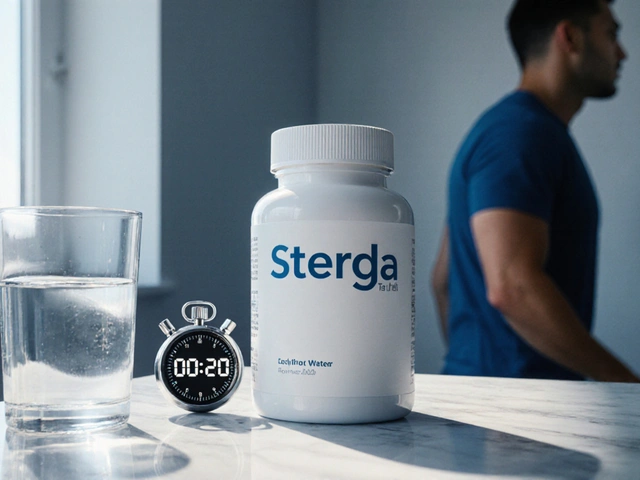If a doctor has mentioned Risperdal to you, you’ve probably felt a bit of worry—or at least some serious curiosity—kick in. Here’s a drug that gets tossed around in conversations about schizophrenia, bipolar disorder, and even autism. But do you know what it actually does and why it’s used for so many different mental health issues? In the world of psychiatric medicine, Risperdal holds a weird kind of fame: for some, it’s a breakthrough; for others, a mixed blessing. The facts go way beyond the tiny print on a medicine leaflet.
What is Risperdal and How Does it Work?
Risperdal is the brand name for risperidone, a so-called “second-generation antipsychotic,” which just means it’s newer than the older, first-generation options like haloperidol. Doctors like Risperdal because it does one thing really well: it tinkers with how your brain uses chemicals called dopamine and serotonin. Think of dopamine like your brain’s message courier—too much, and your thoughts might race wildly (like in mania or schizophrenia), too little, and everything slows down (mood flattening, hard time feeling pleasure). Serotonin, on the other hand, plays a big part in mood, anxiety, and impulsive behavior.
Risperdal blocks certain dopamine and serotonin receptors in your brain. Imagine shutting off a few lights in a bright room—things calm down. Worries, agitation, hallucinations, or delusions can fade. That’s the goal. It’s been FDA-approved since 1993 for adults with schizophrenia, and soon after, it became a go-to for symptoms in bipolar disorder and kids showing severe irritability due to autism.
Here’s a quick table to break down what Risperdal is approved for, and the typical starting doses:
| Condition | Usual Starting Dose | Common Age Groups |
|---|---|---|
| Schizophrenia | 1-2 mg/day | Adults/Teens (13+) |
| Bipolar Mania | 2-3 mg/day | Adults/Teens (10+) |
| Irritability in Autism | 0.25–0.5 mg/day | Kids (5-16 yrs) |
Pro tip: Doses often change based on how your body reacts, so you might start low and increase slowly. Doctors do this to avoid side effects showing up all at once.
Conditions Treated by Risperdal
Risperdal’s main claim to fame is helping people with schizophrenia. If you’ve ever watched someone living with active psychosis, you know how powerful delusions and hallucinations can get. Risperdal doesn’t “cure” these, but it can seriously tamp them down. In a well-known 2018 study from The Lancet, risperidone (the generic for Risperdal) was shown to be as effective as older antipsychotics, but it caused fewer movement disorders—one big reason why it’s often the first thing doctors try.
Bipolar disorder is another big target. When people swing high into mania—talking fast, not sleeping, spending wildly—Risperdal can bring stability. The action is typically pretty fast: many people notice calmer moods within the first week or two. Not instant, but not a long wait either.
Then there’s the trickier group: kids with autism who show severe aggression or self-injury. In one large trial published in 2002, children and teens on Risperdal saw “marked” reductions in screaming, tantrums, and physical aggression within the first month. The FDA officially backed its use for this specific autism symptom set in 2006. This move helped families who’d struggled with nothing else working, though careful monitoring remains key since kids can be more sensitive to side effects.
Off-label, doctors sometimes try Risperdal for Tourette’s, severe anxiety, or PTSD when nothing else calms things down. That doesn’t mean it’s risk-free or should be used by everyone—every prescription is a balancing act of risks versus benefits, person by person.

Common Side Effects and Risks
No medication is perfect, and Risperdal is like any powerful drug: the flip side to its benefits can be a list of side effects. Start with drowsiness—one of the most common problems. You might feel knocked out at first, but your body sometimes adjusts after a couple weeks. Weight gain is a hot topic too. According to a 2019 meta-analysis, people on Risperdal pack on an average of 2–4 kg (that’s 4–9 pounds) over a six-month period. It might not sound like a lot, but for some people, it stacks up over time, especially when paired with major carb cravings the drug can cause.
Then there’s the issue with hormones: Risperdal can raise prolactin, the hormone linked to milk production. High prolactin can cause breast swelling or tenderness, and in rare cases, even produce milk in people who aren’t pregnant (men included). Worth knowing: this side effect is more common in adolescents, and not everyone gets it. If you notice odd physical changes, bring it up right away. No question is too weird.
Movement issues—think tremors, stiffness, or that restless-leg feeling—happen in a smaller chunk of users, mostly at higher doses. These are more likely with old-school antipsychotics, but new ones like Risperdal aren’t totally in the clear. Your doctor will check for these during regular visits.
Other things to watch for: dizziness, especially when standing up fast, can make daily life feel off-kilter. Some people talk about vivid dreams, trouble sleeping, or stomach upsets like mild nausea or constipation. There’s also a very rare but serious side effect called Neuroleptic Malignant Syndrome, which feels like a brutal flu—high fever, stiff muscles, confusion. If you or someone on Risperdal gets these symptoms, it’s emergency room time.
For a quick look at how common some side effects are, here’s a table based on real-world data:
| Side Effect | Approximate Frequency |
|---|---|
| Drowsiness/Fatigue | 20-40% |
| Weight Gain | 15-20% |
| Increased Prolactin | 10-25% |
| Tremor/Stiffness | 5-8% |
| Dizziness | 5-10% |
| Nausea/Constipation | 3-6% |
Avoiding side effects isn’t just luck—low doses, slow changes, and having regular blood work (prolactin levels, blood sugar, cholesterol) all help. Hydrate well and keep a food diary, especially in the first few months. And if weight is an issue, snacking on crunchy veggies and keeping comfort foods out of the house (at least in those early weeks!) is a smart move.
Practical Tips for Taking Risperdal Safely
Taking a new med can feel like you need a PhD just to keep track of the rules. But you don’t. Let’s keep it real: follow instructions, and you’re already ahead. Risperdal is usually started once or twice daily—try to take it at the same time each day to build a steady routine. If you miss a dose? Take it as soon as you remember, unless it’s nearly time for the next one. Then just skip it. Double-dosing doubles the risk for nasty side effects.
If you’re on liquid Risperdal, don’t mix it with cola or tea (weird things can happen with absorption), but feel free to combine it with water, coffee, orange juice, or milk. Always shake the bottle and measure with the special syringe—don’t eyeball it. Consistency matters.
Watch out for drug interactions: common meds that mess with Risperdal include blood pressure pills, antidepressants, certain seizure meds, and even street or party drugs. If you smoke, your dose might change—tobacco can speed up how fast you break down Risperdal, sometimes making it less effective.
- risperdal and alcohol don’t mix. Even small amounts can amplify sleepiness or dizziness.
- Check your blood sugar and cholesterol once or twice a year, especially if you’re gaining weight.
- If you’re pregnant or thinking about it, talk openly to your doctor—it’s a tricky balance of risks, but sometimes, untreated mental illness is riskier than staying on meds.
Because it can make people sweat less (harder to cool down), be careful in hot weather and during exercise. Stay hydrated. And definitely don’t just stop taking Risperdal all at once—sudden withdrawal can mean symptoms come roaring back. If quitting feels right, taper off slow with medical advice.

Personal Stories and Burning Questions
It’s one thing to read about benefits and risks. But what’s it actually like to live with Risperdal? You’ll find people on Reddit and mental health forums talking about their first weeks—some say their thoughts went from wild chaos to manageable in just days, while others battled nap attacks or needed a new wardrobe because of rapid weight gain. For every story of steady moods, there’s another about learning to speak up at doctor visits when things feel off.
Parents of kids on Risperdal often talk about the relief—tantrums down, sleep improved—and also the anxiety of making sure the drug isn’t causing new problems. Teens, especially boys, have to watch out for hormonal side effects, but many say being able to function at school or at home makes the trade-off worth it, at least for a while. Every experience is different.
A lot of people want to know if Risperdal is forever. The honest answer? Sometimes, but not always. Some people can slowly ease off after a year or two if symptoms stay stable; others stay on it medium-term while working through life changes or therapy. Stopping should always be planned, with support, and never done solo or suddenly.
If you have questions, ask. Even the weird ones. Doctors have heard it all. If something doesn’t feel right, insist on being heard. Get lab work done. Keep track of your sleep, mood, weight, and any funky stuff happening in your body. And if you ever feel scared about what’s happening to you or someone you care for, reach out—for help, for reassurance, for new ideas about making things better. Risperdal, like any tool, is only as good as the support behind it.






Comments
Meghan Cardwell
29/May/2025Risperdal operates as a high‑affinity antagonist at D2 dopamine and 5‑HT2A serotonin receptors, thereby attenuating hyperdopaminergic transmission implicated in psychotic symptomatology. Its pharmacokinetic profile features hepatic CYP2D6 metabolism, which can be phenotypically variable among patients, influencing plasma concentrations and tolerability. Clinically, the titration paradigm typically initiates at 0.25–1 mg/day for pediatric populations, with incremental adjustments based on therapeutic response and side‑effect burden. The drug’s receptor occupancy correlates with dose‑dependent prolactin elevation, a factor clinicians monitor via periodic endocrine panels. Moreover, Risperdal’s partial agonist activity at 5‑HT1A receptors may confer adjunctive anxiolytic benefits, though evidence remains heterogeneous. Ultimately, the risk‑benefit calculus necessitates individualized dosing algorithms and vigilant metabolic surveillance.
stephen henson
29/May/2025Great breakdown! 😊 Just remember to keep the dosing steady and don’t jump the gun on any changes – your body needs time to adapt. If you ever feel dizzy or extra sleepy, flag it with your prescriber right away.
Manno Colburn
29/May/2025so like this med, risperdal, it's kinda like an orchestra conductor for our brain chemistry, right? it waves its baton at dopamine and serotonin receptors, telling them to chill out when they're over the top. but think about the metaphysical side – we're essentially externalizing our mental turbulence into a pill, handing the universe a chemical proxy for our inner chaos. the idea that a synthetic molecule can modulate the very essence of perception is both awe‑inspiring and terrifying, like we're playing god with a tiny glass vial. and let's not even get started on prolactin spikes; it's like the body decides to start lactating out of nowhere – a bizarre side‑effect that feels like a plot twist in a sci‑fi novel. weight gain? that's the system's way of converting emotional turmoil into extra mass, a literal manifestation of carrying the weight of your thoughts. also, the CYP2D6 polymorphisms – some folks metabolize it fast, others slow – leading to a labyrinth of dosage calibrations that would make any pharmacist weep. in the grand scheme, we're navigating a delicate balance between symptom suppression and iatrogenic harm, a true tightrope act on a psychiatric high‑wire. the real question isn't just "does it work?" but "at what cost to the holistic self?" and that's a conversation that stretches far beyond the confines of a standard drug monograph. so, while risperdal can be a lifesaver for many, let's stay mindful of the philosophical trade‑offs we’re making every time we swallow that tablet.
Namrata Thakur
29/May/2025Thanks for the deep dive! On a practical note, starting with the lowest possible dose and titrating slowly can really help minimize those hormone‑related side effects. Keep a simple diary of sleep, appetite, and mood changes – it makes the follow‑up visits much more productive.
Chloe Ingham
29/May/2025Do you ever wonder why the pharma giants push this pill like it's a cure‑all, while the side‑effects whisper hidden agendas in the shadows? The weight gain, the mysterious milk production – it's almost as if they want us to be dependent, forever tangled in a web of medical surveillance. And don't get me started on the subtle dopamine dampening that could be flattening our very sense of reality, turning us into compliant consumers of the status quo.
Mildred Farfán
29/May/2025Oh, absolutely – because nothing says "trust" like a medication that can make you gain a few pounds while you’re trying to stay afloat, right? 🙃 But in all seriousness, the key is to stay informed and demand thorough monitoring; otherwise, you’re just a lab rat in a corporate experiment.
Danielle Flemming
29/May/2025Hey folks! 🌟 If you’re starting Risperdal, think of it as a team player in your mental health squad. Keep those appointments, track any changes, and remember that staying active – even a short walk – can combat the weight‑gain side effect. You’ve got this, and we’re all cheering you on!
Anna Österlund
29/May/2025Stop overhyping it, it’s just another pill!
Brian Lancaster-Mayzure
29/May/2025From a mentorship perspective, it's useful to view Risperdal as a variable tool: effective for many, but not universally optimal. Encourage patients to discuss any emergent side effects openly and to consider adjunct lifestyle measures – diet, exercise, stress‑reduction techniques – alongside pharmacotherapy. Consistent follow‑up labs and a collaborative decision‑making process will help tailor the regimen to each individual's needs.